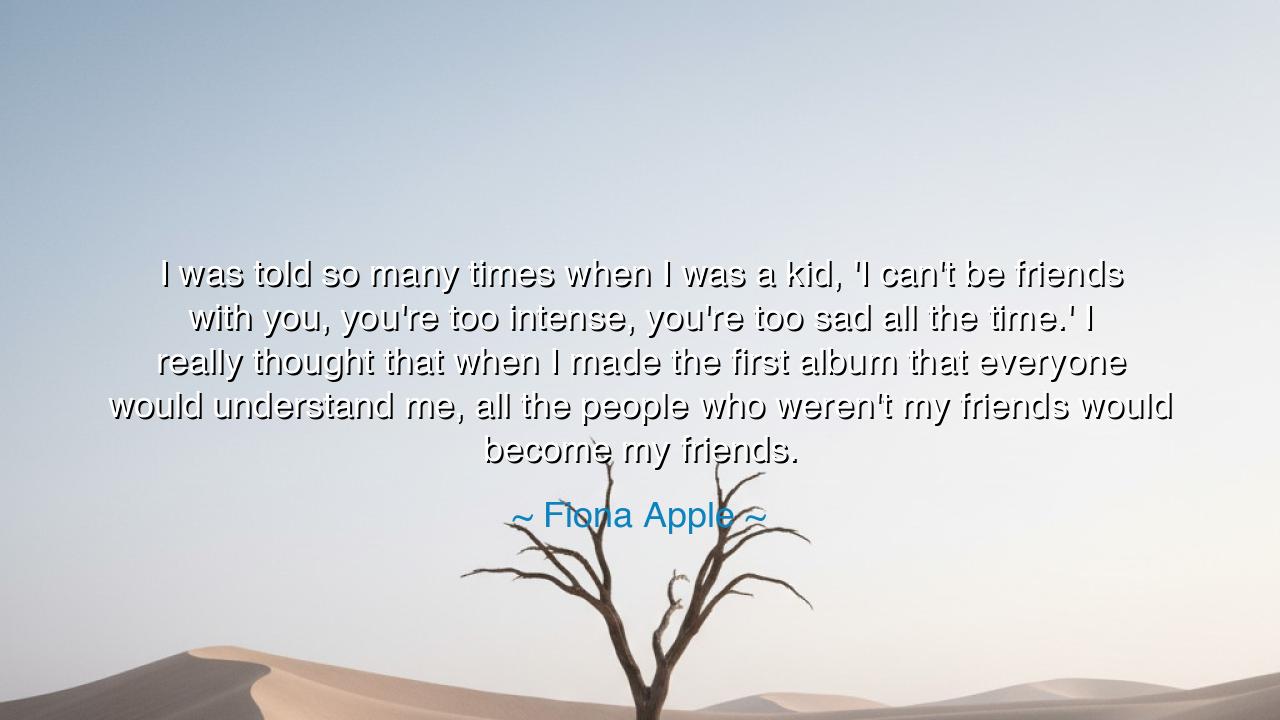
I was told so many times when I was a kid, 'I can't be friends
I was told so many times when I was a kid, 'I can't be friends with you, you're too intense, you're too sad all the time.' I really thought that when I made the first album that everyone would understand me, all the people who weren't my friends would become my friends.






The words of Fiona Apple, “I was told so many times when I was a kid, ‘I can’t be friends with you, you’re too intense, you’re too sad all the time.’ I really thought that when I made the first album that everyone would understand me, all the people who weren’t my friends would become my friends,” carry the sorrow and yearning of the artist’s soul — a soul that feels the world too deeply and longs to be seen not as strange, but as true. Beneath her confession lies one of the oldest struggles known to humankind: the ache of the misunderstood spirit. Her words are not only about childhood loneliness, but about the eternal desire of all creators — to turn pain into art, and art into belonging.
In every age, those who feel most deeply often find themselves set apart. Their hearts burn brighter, their thoughts pierce deeper, and the world, unready for such intensity, recoils. Fiona’s “too intense” and “too sad” were never flaws — they were signs of depth, of sensitivity, of vision. Yet in the innocence of youth, such traits often bring exile rather than admiration. She believed, as many artists do, that through creation — through her music, her vulnerability — she would bridge that distance, that her songs would serve as a bridge of understanding between her soul and the world’s indifference. Her longing is ancient, echoing the same cry heard in the hearts of poets, prophets, and painters through the ages: “If they only heard me, they would know me.”
In her story, one can hear the resonance of Van Gogh, who poured his anguish into paintings of light. The people around him saw madness; posterity saw genius. Like Fiona, he too sought connection through creation — believing that if he painted beauty with honesty, perhaps someone, someday, would finally understand the language of his sorrow. The loneliness of the artist is not born from arrogance but from emotional clarity — the ability to perceive what others hide, and to feel what others fear. The artist’s tragedy is that while their work reaches millions, their heart still yearns for the intimacy of being understood by one.
Fiona Apple’s belief that art could heal the wound of rejection speaks to the spiritual power of expression. To create is to extend one’s soul outward, to carve one’s truth into the world so it can no longer be ignored. Yet even the greatest artists eventually learn that creation cannot always erase loneliness; it transforms it instead. The child who was once told she was “too sad” becomes the woman whose sadness becomes a song, whose vulnerability becomes her gift. The very pain that isolated her becomes the source of her connection with strangers across the earth — listeners who hear her voice and say, “At last, someone understands me.”
This transformation is what the ancients might have called alchemy of the soul — the transmutation of sorrow into meaning, of isolation into art. Every artist, every seeker, must pass through this fire. Just as the sculptor shapes beauty by striking marble, so too must the human spirit endure the blows of misunderstanding to reveal the form within. The hurt that once silenced becomes the heartbeat of creation. And through that act, the artist discovers a new kind of friendship — not with individuals, but with humanity itself.
There is a quiet heroism in Fiona’s vulnerability. To stand before the world and say, “I am too sad, too intense, but this is me,” is an act of courage that few can match. The ancients would have likened her to Cassandra, cursed to see truth and never be believed — yet still speaking it, still refusing to be silent. In a world that often demands simplicity and smiles, to remain complex and authentic is itself a rebellion, a sacred defiance. Fiona’s art, like Cassandra’s voice, endures because truth, though rejected in its time, never truly dies.
The lesson, then, is as timeless as the human heart: what isolates you may one day define you. Do not bury your sadness or your intensity; refine them, channel them, and let them become the material of creation. If the world cannot understand your depths, give it your work — your song, your words, your craft — and let your truth find its own listeners. The people who once turned away will fade, but the ones who recognize themselves in your art will remain forever. For in this world, understanding is not found by conforming, but by daring to be seen as you are — raw, radiant, and real.
And so, remember the teaching hidden within Fiona Apple’s lament: when others say you are “too much,” do not shrink — you are simply more alive. Let your sadness become song, your intensity become flame. Speak, create, express, even if no one listens at first. For the lonely child who sings in the dark is often the one who, in time, lights the way for others still searching for their own voice in the silence.






AAdministratorAdministrator
Welcome, honored guests. Please leave a comment, we will respond soon